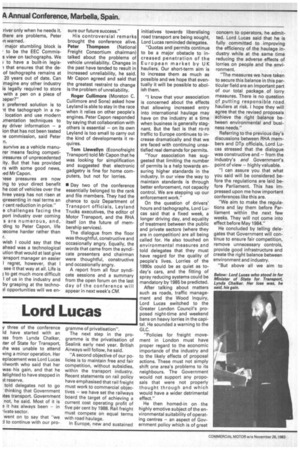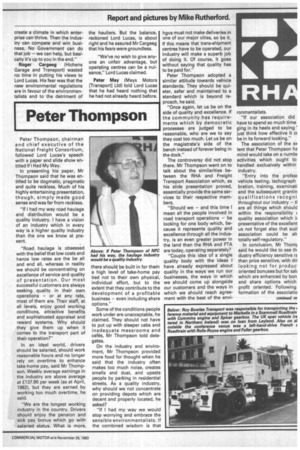Lord Lucas
Page 28

Page 29

If you've noticed an error in this article please click here to report it so we can fix it.
y three of the conference Id have started with an 3ss from Lynda Chalker, ;ter of State for Transport, ;he was unable to attend ',ring a minor operation. Her eplacement was Lord Lucas iilworth who said that her was his gain, and that he ielighted to have stepped in 3t reserve.
told delegates not to go thinking that Government rtes transport. Government not, he said, Most of it is a it has always been — in -ivate sector.
went on to say that "we J to continue with our pro
gramme of privatisation".
The next step in the programme is the privatisation of Sealink early next year. British Airways will follow, he said.
"A second objective of our policies is to maintain free and fair competition, without subsidies, within the transport industry. Recent statements on rail policy have emphasised that rail freight must work to commercial objectives — we have set the railways board the target of achieving a current cost operating profit of five per cent by 1988. Rail freight must compete on equal terms with road haulage.
In Europe, new and sustained initiatives towards liberalising road transport are being sought, Lord Lucas reminded delegates.
"Quotas and permits continue to be a major obstacle to increased penetration of the European market by UK hauliers. Our short-term aim is to increase them as much as possible and we hope that eventually it will be possible to abolish them.
"I know that your association is concerned about the effects that allowing increased entry into international haulage may have on the industry at a time when business is generally stagnant. But the fact is that ro-ro traffic to Europe continues to increase dramatically and that we are faced with continuing unsatisfied real demands for permits.
"Your association has suggested that limiting the number of permits is a help towards ensuring higher standards in the industry. In our view the way to maintain standards is through better enforcement, not capacity control. We are stepping up our enforcement work."
On the question of drivers' hours and tachographs, Lord Lucas said that a fixed week, a longer driving day, and equality of treatment between the public and private sectors (where they are in competition) are all being called for. He also touched on environmental measures and told delegates that they must have regard for the quality of people's lives. Lorries of the 1990s could be as quiet as today's cars, and the fitting of spray reducing systems could be mandatory by 1985 be predicted.
After talking about matters such as roads, traffic management and the Wood Inquiry, Lord Lucas switched to the Greater London Council's proposed night-time and weekend bans on heavy lorries in the capital. He sounded a warning to the GLC.
"Policies for freight movement in London must have proper regard to the economic importance of the industry and to the likely effects of proposal actions. These must not simply shift one area's problems to its neighbours. The Government would not support any proposals that were not properly thought through and which would have a wider detrimental effect."
He then homed-in on the highly emotive subject of the environmental suitability of operating centres — an aspect of Government policy which is of great concern to operators, he admitted. Lord Lucas said that he is fully committed to improving the efficiency of the haulage industry while at the same time reducing the adverse effects of lorries on people and the environment.
"The measures we have taken to secure this balance in this particular field are an important part of our total package of lorry measures. There is no question of putting responsible road hauliers at risk. I hope they will agree that the revised proposals achieve the right balance between environmental and business needs."
Referring to the previous day's discussions between RHA members and DTp officials, Lord Lucas stressed that the dialogue was constructive and — from the industry's and Government's point of view — highly valuable.
"I can assure you that what you said will be considered before the regulations are laid before Parliament. This has impressed upon me how important conferences like this are.
"We aim to make the regulations and lay them before Parliament within the next few weeks. They will not come into effect before May 1984."
He concluded by telling delegates that Government will continue to ensure fair competition, remove unnecessary controls, provide good infrastructure and create the right balance between environment and industry.
"But above all we aim to create a climate in which enterprise can thrive. Then the industry can compete and win business. No Government can do that job — we can help, but basically it's up to you in the end."
Roger Cargeeg (Hichens Garage and Transport) wasted no time in putting his views to Lord Lucas. His fear was that the new environmental regulations are in favour of the environmentalists and to the detriment of the hauliers. But the balance, reckoned Lord Lucas, is about right and he assured Mr Cargeeg that his fears were groundless.
"We've no wish to give anyone an unfair advantage, but operating centres can be a nuisance," Lord Lucas claimed.
Peter May (Mays Motors [Transport] Ltd) told Lord Lucas that he had heard nothing that he had not already heard before.




























































































